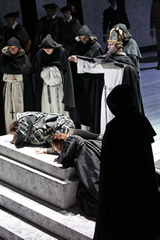| Opera Reviews | 30 April 2024 |
Fabio Luisi makes his mark in La Scala's Don Carloby Silvia Luraghi |
|
| Verdi: Don Carlo Teatro alla Scala, Milan 19 October 2013 |
|
|
The orchestral side of the current production was indeed very convincing, and indicated a good accord between the conductor and the orchestra. The Stéphane Braunschweig production, originally shown in 2008, was revived with some small but important changes. The most controversial feature of this production was the doubling of Carlo, Elisabetta and Posa by children, representing their innocence. In the current revival, Posa's double had been virtually eliminated, and the interventions of the other two were much more limited, and less cryptic, as symbolism was limited to a minimum. As a result, the production was much more compelling. The simple yet impressive sets, dominated by black and white, contrasted with the colorful costumes designed by Thibault van Craenenbroeck, with a nice visual impact especially in the Autodafé scene. The gardens were surrounded by black cypresses, and the deadly atmosphere evoked by the libretto was brought to the stage from the very beginning, when the curtain rose to show the grave of Charles the 1st, surrounded by white rectangles in the background, looking like gravestones. Among the principals, René Pape as Philip dominated the vocal cast with his dark bass, and was deeply touching in his aria 'Ella giammai m'amò.' Fabio Sartori lent his ringing tenor to Don Carlo, with a compelling theatrical interpretation. Martina Serafin was a splendid Elisabetta: her nicely colored, flexible voice adapted easily to all demands of the score, and conveyed a wide palette of feelings. Ekaterina Gubanova as Eboli was only slightly less compelling vocally, but perfect theatrically. Posa was Massimo Cavalletti, who relied on a nice fraseggio, and sounded especially convincing in his first act duet with Philip. tefan Kocán was an authoritative Grand Inquisitor, while the chorus, instructed by Bruno Casoni, sounded perfectly tuned and gave its contribution with commitment. |
|
| Text ©
Silvia Luraghi Photo © Brescia/Amisano © Teatro alla Scala |

 At
La Scala, Maestro Fabio Luisi made his company debut in a fully staged
opera production conducting Giuseppe Verdi's Don Carlo. The conductor
had a very good rapport with the orchestra, and some members reportedly
asked the house management to slow down negotiations with Riccardo Chailly,
who according to rumors, would become the new music director of the
company, and check Luisi's availability first.
At
La Scala, Maestro Fabio Luisi made his company debut in a fully staged
opera production conducting Giuseppe Verdi's Don Carlo. The conductor
had a very good rapport with the orchestra, and some members reportedly
asked the house management to slow down negotiations with Riccardo Chailly,
who according to rumors, would become the new music director of the
company, and check Luisi's availability first. 





